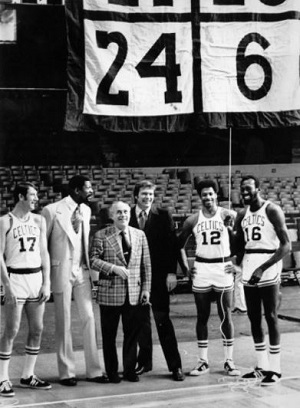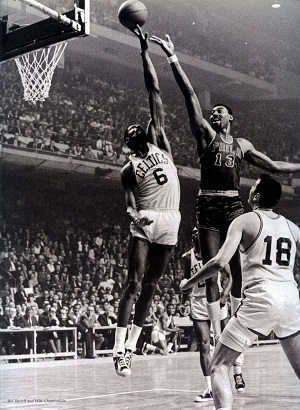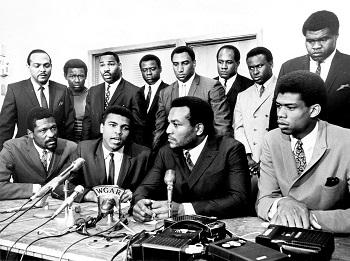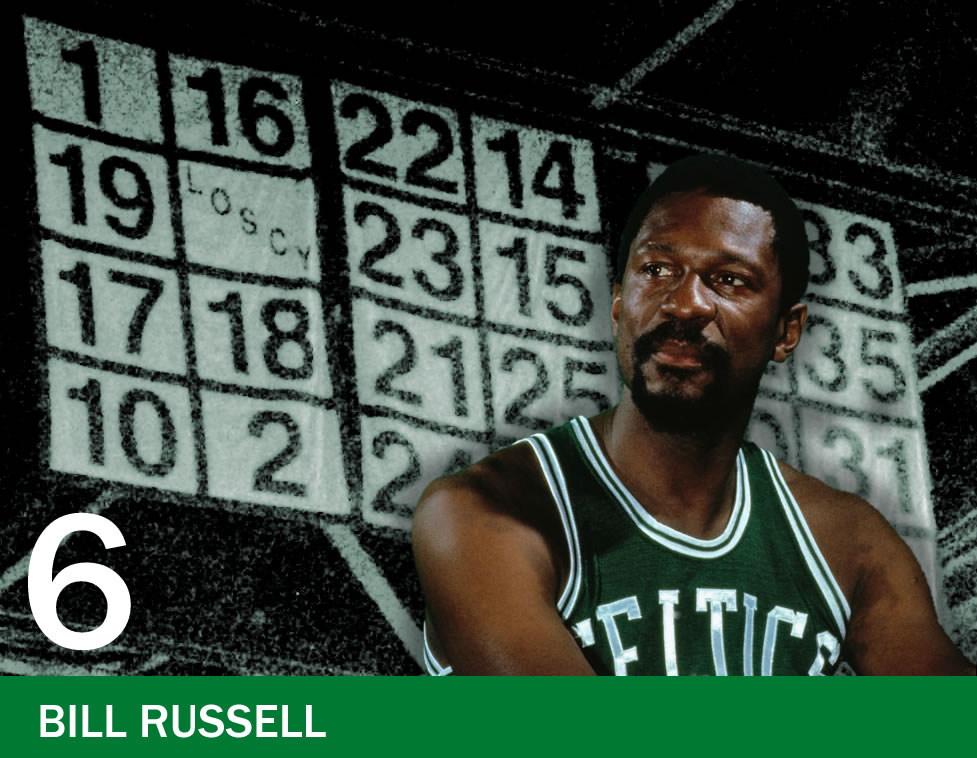From now until February 11, Red’s Army will be posting stories about the players behind the Celtics’ 22 retired numbers and that one retired nickname. Stories will be posted in the order that the numbers were retired.

As long as there is NBA basketball, there will be arguments about who is the greatest player of all time. However, there’s no dispute about who is the winningest. That answer can only be Bill Russell.
Before Michael Jordan, Russell was the consensus pick as G.O.A.T. Number 6 won 11 championships in his 13 seasons in Boston, a record that will never be approached.
Today, though, many critics of the old days push the myth that Russell played his career against weak competition. While it’s true that Russell’s arrival in the NBA was the beginning of the end for slow white guys, Russell and the Celtics did not cruise to the championship every year. They were challenged by Hall of Famers such as Wilt Chamberlain, Jerry West, Elgin Baylor, Bob Pettit and Oscar Robertson.
Those legendary athletes extended the Celtics to Game 7s 10 times, in five East finals and five NBA Finals. Yet Russell found a way to win all 10, while averaging 18.6 points and 29.3 rebounds in those contests.
There was also a five-game series versus Oscar, where Russell posted 16 points and 31 boards in a Game 5 win. Add that one to the Game 7s and the bottom line is this:
Bill Russell played in 11 winner-take-all NBA playoff games, and he won all 11.
Russell has been called the greatest team player of all time. He was a champion at each of the highest levels of the sport. He played center at the University of San Francisco, where he was a two-time All-American while leading the Dons to 55 straight wins and NCAA titles in 1955 and 1956. He then won a gold medal with the undefeated U.S. Olympic Team at the ’56 Summer Games in Melbourne, Australia.
The Celtics acquired Russell when Red Auerbach orchestrated a pre-draft trade with the St. Louis (now Atlanta) Hawks. The details were described in our profile of Ed Macauley. That deal was the first of many steals by Red, but this one changed the course of NBA history more than any of them.
At 6’10” and 215 pounds, Russell transformed the NBA with his length, speed, leaping ability and prolific shot-blocking. His defense and rebounding were the new dimensions that made the Celtics almost unbeatable.
The Celtics defeated the Hawks to win their first-ever title in 1957, Russell’s rookie year; lost in a Finals rematch the next season when the big man suffered an ankle injury; then reeled off a record eight straight championships. Wilt and Philadelphia snapped that streak in 1967, but the Cs bounced back to win it all in 1968 and 1969, Russell’s final two seasons.
If that’s not impressive enough, when Red retired after the 1966 playoffs, Russell became the player-coach of the Celtics for his last three seasons (the first African-American head coach in major American sports). Big Bill coached the Celtics to two championships while also playing roughly 40 minutes per game at center – in the era before assistant coaches existed! That’s something else that will never happen again.
Russell was an All-Star 12 times, All-NBA 11 times, and the league’s Most Valuable Player five times. He was All-Defense in his final season, which was the year in which the NBA created that honor. Stats on blocks were not recorded until after he retired. It’s unfortunate, because Russell absolutely would’ve been the blocked-shot leader and Defensive Player of the Year every single season.
Russell’s career regular season averages were 42.3 minutes, 15.1 points, 22.5 rebounds and 4.3 assists. In the playoffs: 45.4 minutes for 16.2/24.9/4.7. He’s Boston’s career leader in regular season rebounds, with 21,620 – more than the next two on the list (Parish and Cowens) combined. To this day, Russell is also the NBA leader in total playoff rebounds, with 4,104.

Besides his physical abilities, Russell played a thinking man’s game. “The idea is not to block every shot,” he once said. “The idea is to make your opponent believe that you might block every shot.”
When Wilt joined the league during Russell’s fourth season, some observers worried that Chamberlain’s immense size (7’1”, 275) and strength would literally destroy any semblance of competition. How did that go?
According to Basketball Reference, their teams met 94 times in the regular season, with Russ holding a 57-37 advantage. In the playoffs, it was Russell by 29-20. The Celtics won seven of the eight series head-to-head.
In the 1961-62 season, Wilt averaged 50.4 points per game, but Russell won the MVP anyway because the Celtics were 11 wins better than Wilt’s Philadelphia Warriors. (Imagine how that debate would go today?)
Doubters will say Wilt’s teammates were inferior to Russell’s. But when the NBA celebrated its 50th season by naming the league’s 50 Greatest Players, Wilt had played with six of them, Russell with just four. Nine of Wilt’s teammates are enshrined in the Hall of Fame, compared with Russell’s 10. Wilt was also coached by HOFers Alex Hannum, Frank McGuire and Bill Sharman. So the Big Dipper had plenty of support.
How about Russell versus Jerry West, The Logo himself? Again, advantage to the Celtic: regular season, 42-26; playoffs, 24-14; playoff series, 6-0. That’s right, West never beat Russell in a playoff series. And since they only met in the Finals, that’s a major reason Boston has 17 titles to L.A.’s 16.
Even in his final season, when Russell was slowing down at age 34 and dealing with the burden of coaching, he dug deep to lead the Celtics to one more title. After Boston beat Philly in five and New York in six, Russell played all 48 minutes in all seven games of the 1969 Finals. The Cs were down in the series, 3-2, but won Game 6 at home and Game 7 in L.A. to overcome the heavily-favored Lakers of West, Wilt and Baylor.
See why it’s easy to call Russell the greatest winner in basketball history?
That summer, Russell announced his retirement in a blunt Sports Illustrated article. He later coached five mediocre seasons at Seattle and Sacramento – it was the only time he wasn’t a winner (but then again he didn’t have himself at center). He then was an analyst on NBA national telecasts on ABC and CBS.

Russell wasn’t just a basketball legend. He was active in the Civil Rights era, often speaking out about the racial climate in Boston. He took part in the 1963 March on Washington and publicly supported Muhammad Ali’s refusal to serve in the military due to his religious beliefs. Russell’s citizenship ultimately earned him the prestigious Medal of Freedom, presented by President Obama.
Another Russell characteristic is that he believed only in team success and famously resisted individual recognition. He would not sign autographs; when he was inducted into the Basketball Hall of Fame, he didn’t attend the ceremony; and in 1972, when the Celtics wanted to retire Number 6, he said no.
“Red knows how I feel about this,” Russell said that year. “I’m not that type of guy.”
But Russell was coming to Boston for an ABC telecast, so Red arranged a private ceremony for before the Garden doors were opened. Russell was joined by his former teammates who were still on the active roster, and the banner was raised with only a handful of witnesses.
In recent years, Russell has mellowed somewhat. In 1999, he agreed to a special night at the Garden to re-retire his number, with proceeds from the event going to his favorite charity, the National Mentoring Partnership. In 2013, he was honored with a statue at Boston City Hall. Last year, he received a Lifetime Achievement Award from the NBA. And the NBA Finals MVP award is now named for him.
Today, at age 83, Russell is still speaking his mind on Twitter (@RealBillRussell). He has co-authored several books about his life and philosophy, including “Red and Me,” about his relationship with Auerbach.
[youtube https://www.youtube.com/watch?v=SrofennuqeI?rel=0] [youtube https://www.youtube.com/watch?v=hHizcdD9AN0?rel=0] [youtube https://www.youtube.com/watch?v=H2AGB7SrvK8?rel=0]Russell’s playing stats at Basketball Reference
Russell’s coaching stats at Basketball Reference
Biography on Celtics.com Legends section
Biography on NBA.com Legends section
The retired numbers project:
Add The Sports Daily to your Google News Feed!
